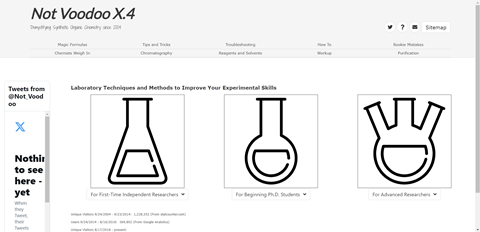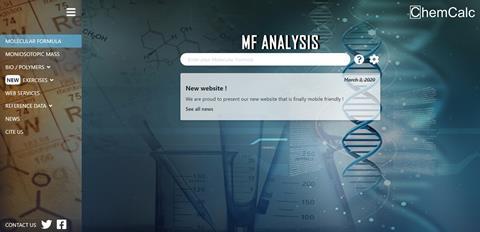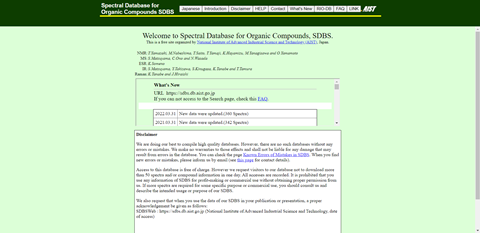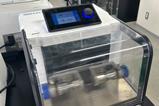A selection of tools, databases and advice sites to support your research
There are hundreds of websites designed to support chemists at every level across all aspects of their work, whether that’s a student interpreting a complicated NMR spectrum, a technician searching for safety information, or a principal investigator editing a paper. Below we’ve gathered a selection of informational resources, online tools and databases to showcase some of the resources available.
Informational Resources

Not Voodoo
Not Voodoo is a huge catalogue of knowledge, instructions and advice covering all aspects of practical organic chemistry. Originally aimed at new researchers, this extensive online resource is now a valuable tool for anyone working on a lab-based organic project. Different sections offer instructions for standard procedures, troubleshooting tips and tricks for practical problems, and useful data points for organic chemists.
The Safety Net
The Safety Net is a collection of downloadable safety resources, designed to support the routine work of synthetic chemistry researchers. Focused on making safety a priority in good science, the website shares the practices and procedures from several contributing research groups and acts as a helpful starting point for researchers experimenting with a new type of chemistry for the first time. Available content includes detailed step-by-step instructions for standard practical procedures, helpful lab signage and safety checklists.
Comp Chem Website
Comp Chem Website is an online guide to getting started with computational chemistry. The bulk of the website focuses on providing support for users working with coding languages and computational programs including Amber, R, Gaussian, and Caver. A smaller section also provides help and advice for other computer-based skills relevant to chemists such as reference management and poster design.
Organic Chemistry Data
Organic Chemistry Data is an informational website hosting a huge bank of organic chemistry resources, relevant to students and researchers at any level. The extensive data pages include pKa tables, NMR solvent and coupling shifts and lists of common reagent acronyms and structures, while the educational section provides thorough explanations of the theory behind common techniques, rules and effects in organic chemistry. The website is now maintained by the American Chemical Society’s Division of Organic Chemistry and welcomes submissions of organic chemistry content to share with the community.
Thrive Lifeline
Thrive Lifeline is an international online community providing mental health support to anyone working within science, technology, engineering, mathematics, and medicine (Stemm) fields, particularly those with marginalised identities. The website hosts a database of more than 600 resources offering advice, coping skills and links to external specialist organisations for every identity. The group also runs a 24-hour text hotline that offers immediate mental health support and advice in times of acute stress or crisis.
Tools

ChemCalc
ChemCalc is a simple tool to calculate and simulate mass spectrometry-related features of compounds, especially in a teaching context. Using molecular formulae, the web calculator determines various chemical details including percentage element composition and monoisotopic mass, and simulates the probable isotopic distribution in the mass spectrum of a given formula. The tool also provides similar isotopic distribution simulations for peptides, nucleotides and polymers.
Reference Resolver
Reference Resolver is a useful tool that quickly directs the user to a specific webpage from a scientific reference. This search engine supports hundreds of journals from across the chemical sciences and can also resolve patent numbers, CAS numbers and PubMed IDs. Reference Resolver is also available as a browser extension for Chrome, Firefox, Safari and AppleScript.
Merck Pressure-Temperature Nomograph
The Merck Pressure-Temperature Nomograph calculates the atmospheric boiling point of compounds distilled under vacuum conditions, a data point required in the supporting information for distillation procedures. The simple sliding tool uses the Clausius-Clapeyron equation, which defines the relationship between pressure and temperature over the gas-liquid phase transition by assuming a constant enthalpy of vaporisation. The nomograph accepts pressure and temperature entries in five different units and provides answers to four and one decimal places respectively.
Overleaf
Overleaf is an online LaTeX editor designed to assist researchers writing and editing scientific documents. This free tool provides a variety of templates for different document types including journal articles, theses or CVs and offers tutorials and webinars to support new users. The platform is particularly helpful for those working on collaborative publications and the system allows multiple users to access and edit documents simultaneously.
Databases

National Institute of Advanced Industrial Science and Technology Spectral Database (AIST SDBS)
AIST SDBS is a spectral database of more than 34,000 different organic compounds. Particularly useful as a comparison or reference when analysing known compound samples, it provides six types of spectral information including 1H and 13C NMR, EI-MS, and FT-IR, alongside chemical, instrument and sample data for each entry. Users may search compounds by name, formula, molecular weight or CAS number.
DETHERM
DETHERM is a database of thermophysical properties including surface tension, vapour pressure, and phase equilibrium data for more than 85,000 pure compounds and 200,000 mixtures. Particularly relevant for apparatus and process design, DETHERM is maintained by German chemical engineering network DECHEMA with different free and paid account options available to suit industrial, academic and teaching needs. The system also allows users to export and process searched data in various file formats and provides demos and support for new users.
ChemExper
ChemExper is a chemical directory for searching chemicals by molecular formula, name, CAS number, substructure, physical characteristics or chemical supplier. The site provides a downloadable PDF of search results and lists global suppliers with product references and quantities for each result. ChemExper has entries for more than 10 million chemicals and is especially useful for comparing potential suppliers.
Cole-Palmer Chemical Compatibility Database
The Cole-Palmer Chemical Compatibility Database is a handy tool to check the compatibility of specific reagents with materials commonly used for chemical storage. Users can select options from drop-down lists and the site returns a compatibility rating from excellent to severe to help inform in-lab storage choices. A second tab enables users to verify the miscibility of common solvent combinations.
NIOSH Pocket Guide
The NIOSH Pocket Guide is an extensive document produced by the Centre for Disease Control providing health and safety information for hundreds of chemicals and substance classes found in scientific workplaces. It has a search tool that allows users to enter key terms to find relevant safety information more quickly and the guide is also available as a PDF download. This resource is helpful for those responsible for establishing safety procedures in a lab environment but also provides useful information for researchers seeking hazard data about a specific chemical.

Online resources for chemists

A selection of tools, databases and advice sites to support your research
 Currently
reading
Currently
reading
Online resources for chemists
- 2



















No comments yet